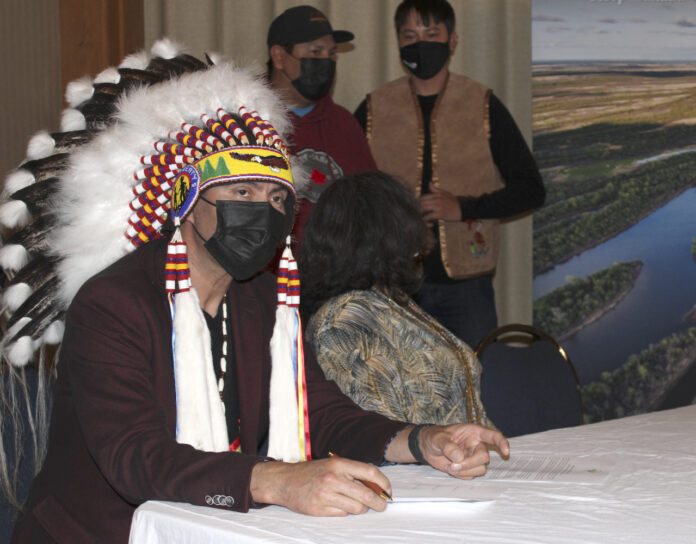
Cumberland House Cree Nation (CHCN) chief and council signed a declaration on Thursday in Prince Albert asserting the community’s right to decide how economic development happens on their traditional territory.
The 10,000 square kilometres of marshes surrounding Cumberland House are home to North America’s largest inland river delta — the Saskatchewan River Delta. It also contains some of Canada’s most biodiverse areas — 80 per cent of which are wetlands.
Those wetland areas are popular nesting grounds for migratory birds, act as a filter for the Saskatchewan River and absorb harmful carbon dioxide from the air.
As stewards of the land, Chaboyer said it is Cumberland House’s position to protect the wetlands — which he called a “gift from the Creator that accords a sacred responsibility.”
He said SaskPower’s E.B Campbell hydroelectric dam near Carrot River is among the factors impacting the environment and his people’s way of life. Pointing to design flaws in the structure he said the dam has choked the water supply to his community and killed off wildlife in the delta.
“Our water has been choked ever since the E.B Campbell Dam has been in place. I’m already in discussions as to how we will remove the dam (and) reconstruct it using environmentally safe procedures,” Chaboyer said.
“I told SaskPower at one point that the Cumberland Cree Nation will eventually own and operate that dam. That’s what I’m working toward. So that we can see natural flow and the nutrients back into the delta.”
He said the $4-billion provincially funded irrigation project at Lake Diefenbaker also needs to be discussed.
“It would affect us. Even more so than how we are being affected right now. We must find a happy medium so that we can all benefit from water use,” Chaboyer said.
Federation of Sovereign Indigenous Nations (FSIN) Vice-Chief Heather Bear said the delta has been hurt by policies and decisions that do not consider or include First Nations’ voices.
“Today that way of doing business comes to an end,” Bear said.
“I have visited the delta many times and I have heard the stories of life with the delta and how important it is to the surrounding nations. I have fished from its waters and used the medicines from its banks. The delta is a life source and a way of life.”
Bear said the delta and the river feeding it have been “greatly negatively altered” by changes to the flow of water “caused by dams and the mismanagement of the water.”
Changes to the surrounding landscape and the loss of natural habitats along the river’s path have hurt the ecosystems that surrounding communities rely on, she said.
“We as First Nations have been living in a respectful relationship with the land since time immemorial,” Bear said.
“The land and water gives us what we need to survive and we in return respect the land and nurture it through our traditional ways.”
Canadian Parks and Wilderness Society (CPAWS) Saskatchewan, executive director Gord Vaadeland congratulated Cumberland House on the announcement, having visited the area personally to support the community’s conservation efforts.
“Today’s declaration honours the decades of efforts of many in the community along with this landscape so deserving and in need of conservation,” Vaadeland said.
“For decades, First Nations and Métis people in Cumberland House have worked passionately to conserve their homeland and urgently address the impacts of upstream activities.”
Chaboyer laid out policies on economic development and the protection of the delta to balance environmental stewardship and economic prosperity within the community.
He stressed the importance of consent and that business be conducted “in accordance with our law on the sharing of lands and natural resources with the settler society.”
“It’s no secret that First Nations have been oppressed and have never benefited from the treaties. So, we’re here to break that cycle,” Chaboyer said.
“The impoverished state of our nation is perpetuated by the legislative agenda of the settler society directed at our people. This can no longer be tolerated.”
Cumberland Wood Products (CWP), incorporated last year as an Indigenous owned partnership between CHCN and Timanaska Development Corp., will be a key player in decolonizing how business is done in the delta.
CWP CEO Aaron Kuchirka said leadership has realized a path forward that will balance environmental stewardship and economic longevity in a way that is sustainable.
He said the announcement is an opportunity for CWP to build ‘meaningful economic partnerships” that will directly benefit shareholders and their communities.
“Our vision is based on the principle of recognizing the inherent value of the ecological services of the delta — and its ability to provide the economic base to sustain its services for the benefit of future generations —in terms of improved environment and more resilient communities,” Kuchirka said.
Chaboyer said he plans to break down “the economic barriers that exist in Indian country.”
Those barriers exist, he said, because the Indian Act prohibited Indigenous commerce.
“The Natural Resources Transfer Act also took away our commercial rights and ensures we don’t make a living off our natural resources,” Chaboyer said.
“This is our land, and we should all stand against legislative subjugation, and we will break down those economic barriers with the help of our partners.”

